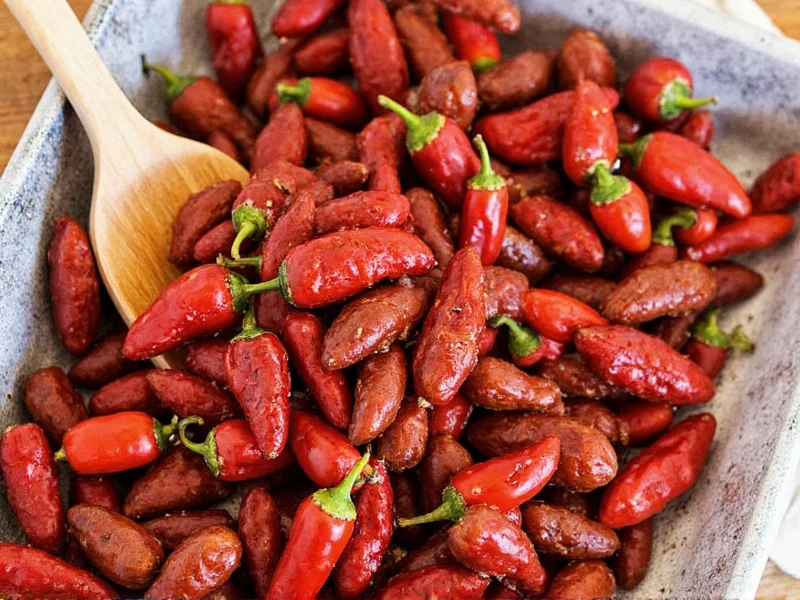When crafting the perfect brisket seasoning, understanding pepper selection is crucial. Brisket's substantial fat content and long cooking process demand a pepper that can maintain its character through hours of smoking. Not all peppers deliver the same results, and choosing wisely can make the difference between ordinary and exceptional barbecue.
Why Pepper Matters in Brisket Seasoning
Pepper isn't just a background note in brisket preparation—it's a foundational element that interacts with smoke, salt, and the meat's natural flavors. The right pepper creates a complex crust (or 'bark') that seals in moisture while developing deep, nuanced flavors. Unlike more delicate meats, brisket can handle bold seasoning because its rich marbling stands up to strong flavors without becoming overwhelmed.
During the smoking process, volatile compounds in pepper react with smoke particles, creating new flavor compounds through the Maillard reaction. This chemical transformation is why freshly ground pepper outperforms pre-ground versions—the essential oils that create these complex flavors dissipate quickly after grinding.
Pepper Varieties Compared for Brisket
| Pepper Type | Flavor Profile | Best For Brisket? | Grind Recommendation |
|---|---|---|---|
| Tellicherry Black Pepper | Complex, woody, floral notes with moderate heat | ★★★★★ (Ideal) | Coarse (¼ inch) |
| Vietnamese Black Pepper | Sharp, pungent, higher heat level | ★★★☆☆ (Good for bold rubs) | Medium-coarse |
| White Pepper | Milder, earthy, less complex | ★☆☆☆☆ (Limited use) | Medium |
| Cubeb Pepper | Floral, slightly medicinal, complex | ★★☆☆☆ (Specialty blends) | Coarse |
| Peppercorn Blends | Varies by composition | ★★★★☆ (Excellent with proper ratios) | Coarse |
Tellicherry Black Pepper: The Brisket Gold Standard
Tellicherry black pepper, harvested from mature peppercorns in Kerala, India, has become the preferred choice among competitive pitmasters and backyard barbecue enthusiasts alike. Its larger size (minimum 4.25mm diameter) contains higher concentrations of essential oils that create more complex flavor compounds when exposed to heat.
What makes Tellicherry particularly effective for brisket? The pepper's natural oil content (4-9%) creates a better bark formation during the stall phase of smoking. As the meat's surface temperature stabilizes around 150-170°F, these oils help create a moisture barrier that allows the seasoning to adhere while facilitating the crucial Maillard reaction.
For authentic Texas-style brisket, many pitmasters recommend using 70-80% coarse Tellicherry black pepper in their rubs. This high concentration might seem excessive to beginners, but brisket's substantial size and long cooking time require bold seasoning that can penetrate the meat's surface and withstand hours of smoke exposure.
Optimizing Pepper Application for Brisket
The timing and method of pepper application significantly impact final flavor. Contrary to popular belief, applying pepper too early can cause it to burn during extended smoking. The optimal approach involves:
- Dry brine with salt only (12-24 hours before cooking)
- Apply pepper rub just before placing meat in smoker (30-60 minutes prior)
- Reapply pepper during the stall phase (optional for extra bold flavor)
When grinding pepper for brisket, aim for a coarse consistency where individual peppercorns are broken into 3-5 pieces. This "cracked" texture creates varying surface areas that release flavor compounds at different rates throughout the cooking process. Fine grinding creates a more immediate but shorter-lived flavor impact that often burns off during long smokes.
Creating Effective Pepper Blends for Brisket
While pure Tellicherry pepper works beautifully, many pitmasters enhance their brisket rubs with complementary pepper varieties. Consider these professional blending ratios:
- Texas Traditional: 80% Tellicherry black pepper, 20% coarse sea salt
- Complex Flavor Profile: 60% Tellicherry, 20% Szechuan peppercorns, 15% smoked paprika, 5% garlic powder
- Bold Heat Version: 50% Tellicherry, 30% Vietnamese black pepper, 15% cayenne, 5% mustard powder
When incorporating additional peppers, remember that Szechuan peppercorns provide a unique tingling sensation rather than heat, while pink peppercorns offer floral notes but can become bitter when smoked. For competition-style brisket, many experts recommend keeping additional pepper varieties below 25% of the total blend to avoid muddying the primary pepper flavor.
Common Pepper Mistakes in Brisket Preparation
Even experienced pitmasters sometimes make these critical pepper-related errors:
- Using pre-ground pepper: Loses 70% of volatile flavor compounds within 24 hours
- Applying too early: Causes pepper to burn during extended smoking sessions
- Incorrect ratios: Less than 30% pepper in rub often disappears during cooking
- Over-mixing with salt: Creates uneven distribution that leads to salty patches
- Ignoring humidity factors: Damp conditions require slightly coarser grind for proper adhesion
Professional pitmasters emphasize that pepper quality matters more than quantity. Investing in fresh, high-grade peppercorns makes a more significant difference than simply increasing the amount used. Store whole peppercorns in an airtight container away from light and moisture, and grind immediately before application for maximum flavor impact.
Expert Tips for Maximizing Pepper Flavor in Brisket
Seasoned barbecue professionals employ these advanced techniques to elevate their pepper game:
- Toast peppercorns lightly before grinding to enhance aromatic compounds (350°F for 3-5 minutes)
- Combine with rendered beef tallow for the final rub application to improve adhesion
- Use different grind sizes in the same rub—coarse for texture, fine for immediate flavor release
- Apply in multiple stages—initial coat, then additional pepper during the stall phase
- Consider wood pairing: Oak smoke complements Tellicherry pepper better than fruit woods
For competition barbecue, many top pitmasters create a pepper 'slurry' by mixing freshly ground pepper with a small amount of water or apple juice to form a paste. This technique ensures even distribution and better adhesion during the critical first hour of smoking when the meat's surface is most receptive to seasoning.
Final Considerations for Pepper Selection
The best pepper for brisket ultimately depends on your specific cooking conditions and flavor preferences. High-humidity environments may require slightly coarser grinding to prevent clumping, while longer cooks (14+ hours) benefit from the more complex flavor profile of Tellicherry pepper. For beginners, starting with a simple 50/50 salt-pepper rub using coarse Tellicherry provides an excellent foundation before experimenting with more complex blends.











 浙公网安备
33010002000092号
浙公网安备
33010002000092号 浙B2-20120091-4
浙B2-20120091-4